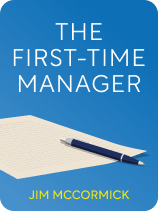

This article is an excerpt from the Shortform book guide to "The First-Time Manager" by Jim McCormick. Shortform has the world's best summaries and analyses of books you should be reading.
Like this article? Sign up for a free trial here.
How should managers work to improve themselves? How can you run efficient meetings?
In The First-Time Manager, organizational risk expert Jim McCormick explores tips for excelling in your management role. These tips include using your time and resources wisely, developing yourself, working with your superiors, and preparing for future opportunities.
Below we’ll dive into these management tips so you can be the leader you’re meant to be.
1. Use Your Time and Resources Wisely
McCormick writes that one great management tip is knowing how to use their time and resources effectively. Two ways you can increase your efficiency are to delegate tasks to your employees and run productive meetings.
1) Delegate tasks. Delegate by reflecting on your current tasks and reassigning any that might help your employees develop their skills or improve your organization’s efficiency. Consider which person on your team is best suited for each task, then meet with them to discuss it in detail. By delegating tasks, you can save time and energy for important responsibilities and prevent high turnover, which often occurs when employees are only assigned low-value work.
(Shortform note: When delegating tasks, don’t tell people what to do and how to do it. In The 7 Habits of Highly Effective People, Steven R. Covey says this delegation approach wastes time and energy, which defeats the purpose of delegating the task. Instead, tell your employees the goal and allow them to devise the plan of action. To help them succeed, communicate six things: The results you’re looking for, the rules and guidelines, ineffective methods, available resources, how the results will be evaluated, and the consequences of success or failure.)
2) Run productive meetings. McCormick suggests sending out a meeting agenda in advance to all participants. This ensures everyone is prepared beforehand, which wastes less time. Only invite people who need to be there and during the meeting, discuss the most important topics first. Running productive meetings saves your organization time and money.
(Shortform note: In Death By Meeting, Patrick Lencioni suggests having multiple types of meetings with different purposes and structures. He recommends four: The check-in meeting (a daily 5-minute meeting for everyone to discuss what they’re working on), the tactical meeting (an hour-long meeting to discuss updates on larger logistical issues, like whether the team is meeting goals), the strategic meeting (a two-to-four hour long meeting to discuss three big questions), and the review (a longer discussion about the direction of your organization). Having multiple types of meetings ensures everyone knows what to expect, what needs to be accomplished, and how to prepare accordingly.)
2. Keep Developing Yourself
According to McCormick, good managers also continuously develop their emotional intelligence and communication skills. By improving these skills, you’ll gain a better understanding of how to support your team’s success.
Having high emotional intelligence means you have good people skills, can recognize your own and other people’s feelings, and can cope well with stress. McCormick says emotional intelligence can be improved and suggests you work on doing so to improve your ability to build relationships and empower your team.
(Shortform note: While McCormick doesn’t explain how you can develop emotional intelligence, other experts provide some guidance. According to Jean Greaves and Travis Bradberry in Emotional Intelligence 2.0, the first step is developing more self-awareness—knowing your emotions. You can practice this skill by paying attention to how your body responds when you experience an emotion—for example, you might notice your heart beats quickly when you’re anxious. By recognizing your body’s physical responses to an emotion, you can more quickly recognize how you’re feeling in your daily life.)
McCormick also argues that you must be able to express yourself well if you want to manage people and projects successfully. To improve your communication skills, both verbal and written, seek out training or books as well as clubs to practice public speaking in.
(Shortform note: Research shows that effective communication has become even more important in the wake of the Covid-19 pandemic and the rise of hybrid and remote work. One study analyzed 6.5 million job postings and found that effective communication was the most sought-after soft skill, appearing 35 times more than other skills like empathy or adaptability. This supports McCormick’s suggestion to improve your communication skills regardless of the field you’re in.)
3. Work Well With Your Superiors
Your success as a manager depends not only on how well you work with your team, but also on how well you work with your superiors. Just as you should seek to understand your employees, you should also understand the needs and work preferences of those you report to. Figure out how your manager likes to communicate and adapt accordingly. As a rule of thumb, you should always keep them updated on your current projects and be respectful of their time by being well-prepared.
(Shortform note: Proactively figuring out how to be the best employee you can be for your superiors is often referred to as “managing up.” In The First 90 Days, Michael Watkins gives a few additional tips on how you can do so. He recommends having a discussion with your boss about what success looks like in your role. You should then learn your boss’s working style by being observant or talking with people who have worked with them in the past. Watkins also suggests you discuss differences in your work or communication styles to avoid potential conflicts or misunderstandings.)
4. Prepare for Future Opportunities
Once you’ve cultivated a team of empowered employees and learned to successfully handle your managerial responsibilities, you can start positioning yourself for promotion. McCormick suggests you plan for someone to replace your current role once you’re comfortably performing your job well. This way, you can avoid creating a gap in your department that would make it difficult for upper management to promote you. By having someone who can fill your position, you put yourself in a better position to be promoted.
If you already have someone in mind, let them handle small portions of your job until they’ve learned most of it. If you don’t have a potential replacement in mind, consider letting several employees take on some of your tasks. Once you have someone capable of taking over, start talking about their potential to your boss.
(Shortform note: McCormick’s suggestion to prepare a replacement for your role is known as “succession planning,” a practice encouraged by many experts. If you’re not sure which employee is best suited for the job, figure out which team member the other team members already go to for support. This is a sign that this person has good leadership abilities and communication skills. However, before you start handing over some responsibilities, discuss their career aspirations with them first and make sure they’re interested in being promoted. Once they’ve expressed interest, talk about your role with them and let them shadow you before delegating tasks.)

———End of Preview———
Like what you just read? Read the rest of the world's best book summary and analysis of Jim McCormick's "The First-Time Manager" at Shortform.
Here's what you'll find in our full The First-Time Manager summary:
- How to succeed as a manager, whether it's your first time or not
- Why managers should shift their focus from tasks to people
- How to gain the trust of your employees and empower them to take initiative






